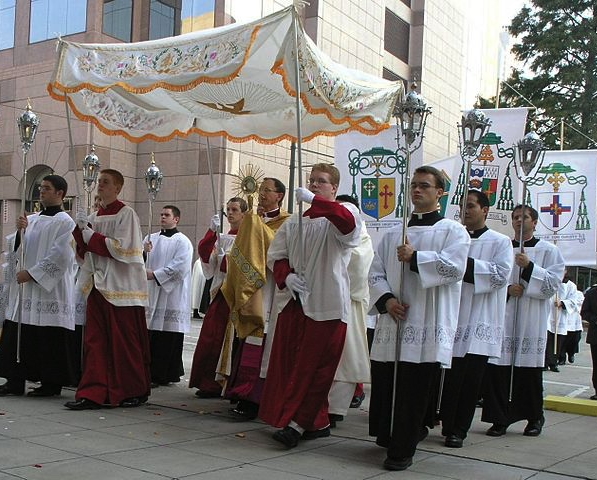[Ed. Recall when the Catholic Church uses the word “mystery”, it does not mean something unknowable. Rather, it means something infinitely knowable. Key.]
-by Rev Gabriel of St Mary Magdalen, OCD, Divine Intimacy, Baronius Press, (c) 1964
Presence of God – O Jesus, I believe that You are present in the Blessed Sacrament of the altar, and I adore You. Increase my faith.
MEDITATION
In the Canon [Eucharistic Prayer] of the Mass, the Eucharist is called “Mysterium fidei,” the Mystery of faith; indeed, only faith can make us see God present under the appearances of bread. Here, as St. Thomas says, the senses do not help at all—sight, touch, and taste are deceived, finding in the consecrated Host only a little bread. But what matters? We have the word of the Son of God; the word of Christ, Who declared: “This is My Body … This is My Blood” and we firmly believe in His word. “Credo quidquid dixit Dei Filius, nil hoc verbo Veritatis verius.” I believe everything the Son of God has said; nothing can be truer than this word of Truth (Adoro Te Devote by St Thomas Aquinas, OP)…
I devoutly adore you, O hidden Deity,
Truly hidden beneath these appearances.
My whole heart submits to You,
And in contemplating You, it surrenders itself completely.
Sight, touch, taste are all deceived in their judgment of You,
But hearing suffices firmly to believe.
I believe all that the Son of God has spoken;
There is nothing truer than this word of truth.
On the cross only the divinity was hidden,
But here the humanity is also hidden.
Yet believing and confessing both,
I ask for what the repentant thief asked.
I do not see the wounds as Thomas did,
But I confess that You are my God.
Make me believe more and more in You,
Hope in You, and love You.
O memorial of our Lord’s death!
Living bread that gives life to man,
Grant my soul to live on You,
And always to savor Your sweetness.
Lord Jesus, Good Pelican1,
wash my filthiness and clean me with Your blood,
One drop of which can free
the entire world of all its sins.
Jesus, Whom now I see hidden,
I ask You to fulfill what I so desire:
That the sight of Your face being unveiled
I may have the happiness of seeing Your glory. Amen.
…We firmly believe in the Eucharist, we have no doubts about it; unfortunately, however, we must admit that our faith is often weak and dull. Although we may not live far from a church, although we may perhaps dwell under the same roof with Jesus in the Blessed Sacrament, it is easy to become rather indifferent, or even cold, in the presence of this great reality. Alas, our coarse nature gradually grows accustomed to even the most sublime and beautiful realities, so that they no longer impress us and have no power to move us, especially when they are near at hand. Thus it happens that while we believe in the ineffable presence of Jesus in the Blessed Sacrament, we pay little or no attention to the greatness of this reality, and we fail to have the lively, concrete appreciation of it which the saints had. Let us then repeat, very humbly and confidently, the Apostles’ beautiful prayer: “Domine, adauge nobis fidem,” Lord, increase our faith! (Luke 17:5).
COLLOQUY
“Praise and thanks to you, O blessed faith! You tell me with certitude that the Blessed Sacrament of the altar, the heavenly Manna, is no longer bread, but my Lord Jesus Christ Who is wholly present there for love of me.
“One day, O Jesus, full of love and of goodness, You sat beside the well to await the Samaritan woman, that You might convert and save her. Now, You dwell on our altars, hidden in the consecrated Host, where You wait and sweetly invite souls, to win them to Your love. From the tabernacle You seem to say to us all: ‘O men, why do you not come to Me, Who love you so much? I am not come to judge you! I have hidden myself in this Sacrament of love only to do good and to console all who have recourse to Me’; I understand, O Lord; love has made You our prisoner; the passionate love You have for us has so bound You that it does not permit You to leave us.
“O Lord, You find Your delight in being with us, but do we find ours in being with You? Especially do we, who have the privilege of dwelling so near Your altar, perhaps even in Your very own house, find our delight in being with You? Oh! how much coldness, indifference, and even insults You have to endure in this Sacrament, while You remain there to help us by Your presence!
“O God, present in the Eucharist, O Bread of Angels, O heavenly Food, I love You; but You are not, nor am I, satisfied with my love. I love You, but I love You too little! Banish from my heart, O Jesus, all earthly affections and give place, or better, give the whole place to Your divine love. To fill me with Yourself, and to unite Yourself entirely to me, You come down from heaven upon the altar every day; justly then, should I think of nothing else but of loving, adoring, and pleasing You. I love You with my whole soul, with all my strength. If You want to make a return for my love, increase it and make it always more ardent!” (St. Alphonsus).”
Love,
Matthew
1. In medieval Europe, the pelican was thought to be particularly attentive to her young, to the point of providing her own blood by wounding her own breast when no other food was available. As a result, the pelican came to symbolize the Passion of Jesus and the Eucharist.

